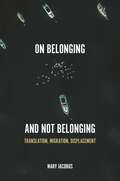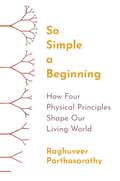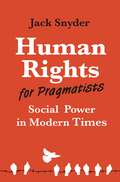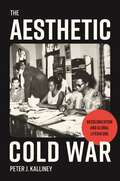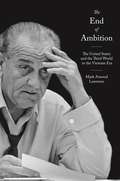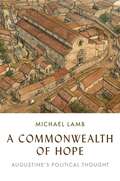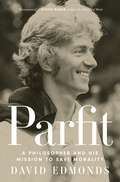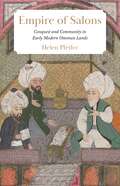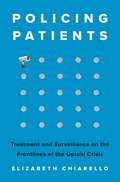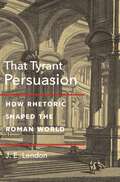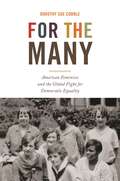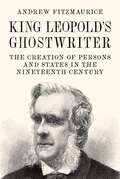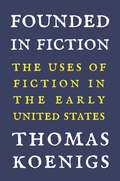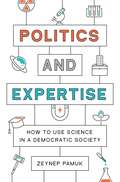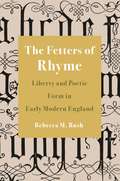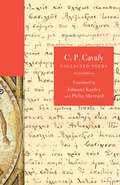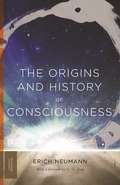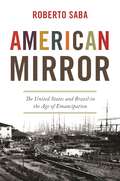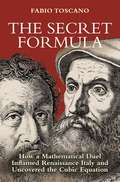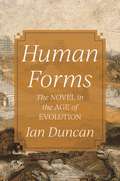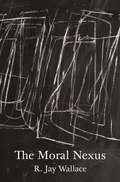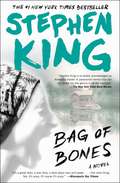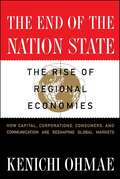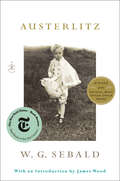- Table View
- List View
On Belonging and Not Belonging: Translation, Migration, Displacement
by Mary JacobusA look at how ideas of translation, migration, and displacement are embedded in the works of prominent artists, from Ovid to Tacita DeanOn Belonging and Not Belonging provides a sophisticated exploration of how themes of translation, migration, and displacement shape an astonishing range of artistic works. From the possibilities and limitations of translation addressed by Jhumpa Lahiri and David Malouf to the effects of shifting borders in the writings of Eugenio Montale, W. G. Sebald, Colm Tóibín, and many others, esteemed literary critic Mary Jacobus looks at the ways novelists, poets, photographers, and filmmakers revise narratives of language, identity, and exile. Jacobus’s attentive readings of texts and images seek to answer the question: What does it mean to identify as—or with—an outsider?Walls and border-crossings, nomadic wanderings and Alpine walking, the urge to travel and the yearning for home—Jacobus braids together such threads in disparate times and geographies. She plumbs the experiences of Ovid in exile, Frankenstein’s outcast Being, Elizabeth Bishop in Nova Scotia and Brazil, Walter Benjamin’s Berlin childhood, and Sophocles’s Antigone in the wilderness. Throughout, Jacobus trains her eye on issues of transformation and translocation; the traumas of partings, journeys, and returns; and confrontations with memory and the past.Focusing on human conditions both modern and timeless, On Belonging and Not Belonging offers a unique consideration of inclusion and exclusion in our world.
So Simple a Beginning: How Four Physical Principles Shape Our Living World
by Raghuveer ParthasarathyA biophysicist reveals the hidden unity behind nature&’s breathtaking complexityThe form and function of a sprinting cheetah are quite unlike those of a rooted tree. A human being is very different from a bacterium or a zebra. The living world is a realm of dazzling variety, yet a shared set of physical principles shapes the forms and behaviors of every creature in it. So Simple a Beginning shows how the emerging new science of biophysics is transforming our understanding of life on Earth and enabling potentially lifesaving but controversial technologies such as gene editing, artificial organ growth, and ecosystem engineering.Raghuveer Parthasarathy explains how four basic principles—self-assembly, regulatory circuits, predictable randomness, and scaling—shape the machinery of life on scales ranging from microscopic molecules to gigantic elephants. He describes how biophysics is helping to unlock the secrets of a host of natural phenomena, such as how your limbs know to form at the proper places, and why humans need lungs but ants do not. Parthasarathy explores how the cutting-edge biotechnologies of tomorrow could enable us to alter living things in ways both subtle and profound.Featuring dozens of original watercolors and drawings by the author, this sweeping tour of biophysics offers astonishing new perspectives on how the wonders of life can arise from so simple a beginning.
Human Rights for Pragmatists: Social Power in Modern Times (Human Rights and Crimes against Humanity #48)
by Jack SnyderAn innovative framework for advancing human rights Human rights are among our most pressing issues today, yet rights promoters have reached an impasse in their effort to achieve rights for all. Human Rights for Pragmatists explains why: activists prioritize universal legal and moral norms, backed by the public shaming of violators, but in fact rights prevail only when they serve the interests of powerful local constituencies. Jack Snyder demonstrates that where local power and politics lead, rights follow. He presents an innovative roadmap for addressing a broad agenda of human rights concerns: impunity for atrocities, dilemmas of free speech in the age of social media, entrenched abuses of women’s rights, and more.Exploring the historical development of human rights around the globe, Snyder shows that liberal rights–based states have experienced a competitive edge over authoritarian regimes in the modern era. He focuses on the role of power, the interests of individuals and the groups they form, and the dynamics of bargaining and coalitions among those groups. The path to human rights entails transitioning from a social order grounded in patronage and favoritism to one dedicated to equal treatment under impersonal rules. Rights flourish when they benefit dominant local actors with the clout to persuade ambivalent peers. Activists, policymakers, and others attempting to advance rights should embrace a tailored strategy, one that acknowledges local power structures and cultural practices.Constructively turning the mainstream framework of human rights advocacy on its head, Human Rights for Pragmatists offers tangible steps that all advocates can take to move the rights project forward.
Promised Lands: The British and the Ottoman Middle East
by Jonathan ParryA major history of the British Empire&’s early involvement in the Middle EastNapoleon&’s invasion of Egypt in 1798 showed how vulnerable India was to attack by France and Russia. It forced the British Empire to try to secure the two routes that a European might use to reach the subcontinent—through Egypt and the Red Sea, and through Baghdad and the Persian Gulf. Promised Lands is a panoramic history of this vibrant and explosive age.Charting the development of Britain&’s political interest in the Middle East from the Napoleonic Wars to the Crimean War in the 1850s, Jonathan Parry examines the various strategies employed by British and Indian officials, describing how they sought influence with local Arabs, Mamluks, Kurds, Christians, and Jews. He tells a story of commercial and naval power—boosted by the arrival of steamships in the 1830s—and discusses how classical and biblical history fed into British visions of what these lands might become. The region was subject to the Ottoman Empire, yet the sultan&’s grip on it appeared weak. Should Ottoman claims to sovereignty be recognised and exploited, or ignored and opposed? Could the Sultan&’s government be made to support British objectives, or would it always favour France or Russia?Promised Lands shows how what started as a geopolitical contest became a drama about diplomatic competition, religion, race, and the unforeseen consequences of history.
The Aesthetic Cold War: Decolonization and Global Literature
by Peter J. KallineyHow decolonization and the cold war influenced literature from Africa, Asia, and the CaribbeanHow did superpower competition and the cold war affect writers in the decolonizing world? In The Aesthetic Cold War, Peter Kalliney explores the various ways that rival states used cultural diplomacy and the political police to influence writers. In response, many writers from Africa, Asia, and the Caribbean—such as Chinua Achebe, Mulk Raj Anand, Eileen Chang, C.L.R. James, Alex La Guma, Doris Lessing, Ngũgĩ wa Thiong'o, and Wole Soyinka—carved out a vibrant conceptual space of aesthetic nonalignment, imagining a different and freer future for their work.Kalliney looks at how the United States and the Soviet Union, in an effort to court writers, funded international conferences, arts centers, book and magazine publishing, literary prizes, and radio programming. International spy networks, however, subjected these same writers to surveillance and intimidation by tracking their movements, tapping their phones, reading their mail, and censoring or banning their work. Writers from the global south also suffered travel restrictions, deportations, imprisonment, and even death at the hands of government agents. Although conventional wisdom suggests that cold war pressures stunted the development of postcolonial literature, Kalliney's extensive archival research shows that evenly balanced superpower competition allowed savvy writers to accept patronage without pledging loyalty to specific political blocs. Likewise, writers exploited rivalries and the emerging discourse of human rights to contest the attentions of the political police.A revisionist account of superpower involvement in literature, The Aesthetic Cold War considers how politics shaped literary production in the twentieth century.
The End of Ambition: The United States and the Third World in the Vietnam Era (America in the World #57)
by Mark Atwood LawrenceA groundbreaking new history of how the Vietnam War thwarted U.S. liberal ambitions in the developing world and at home in the 1960sAt the start of the 1960s, John F. Kennedy and other American liberals expressed boundless optimism about the ability of the United States to promote democracy and development in Asia, Africa, the Middle East, and Latin America. With U.S. power, resources, and expertise, almost anything seemed possible in the countries of the Cold War’s “Third World”—developing, postcolonial nations unaligned with the United States or Soviet Union. Yet by the end of the decade, this vision lay in ruins. What happened? In The End of Ambition, Mark Atwood Lawrence offers a groundbreaking new history of America’s most consequential decade. He reveals how the Vietnam War, combined with dizzying social and political changes in the United States, led to a collapse of American liberal ambition in the Third World—and how this transformation was connected to shrinking aspirations back home in America.By the middle and late 1960s, democracy had given way to dictatorship in many Third World countries, while poverty and inequality remained pervasive. As America’s costly war in Vietnam dragged on and as the Kennedy years gave way to the administrations of Lyndon B. Johnson and Richard M. Nixon, America became increasingly risk averse and embraced a new policy of promoting mere stability in the Third World. Paying special attention to the U.S. relationships with Brazil, India, Iran, Indonesia, and southern Africa, The End of Ambition tells the story of this momentous change and of how international and U.S. events intertwined.The result is an original new perspective on a war that continues to haunt U.S. foreign policy today.
A Commonwealth of Hope: Augustine's Political Thought
by Michael LambA bold new interpretation of Augustine&’s virtue of hope and its place in political lifeWhen it comes to politics, Augustine of Hippo is renowned as one of history&’s great pessimists, with his sights set firmly on the heavenly city rather than the public square. Many have enlisted him to chasten political hopes, highlighting the realities of evil and encouraging citizens instead to cast their hopes on heaven. A Commonwealth of Hope challenges prevailing interpretations of Augustinian pessimism, offering a new vision of his political thought that can also help today&’s citizens sustain hope in the face of despair.Amid rising inequality, injustice, and political division, many citizens wonder what to hope for in politics and whether it is possible to forge common hopes in a deeply polarized society. Michael Lamb takes up this challenge, offering the first in-depth analysis of Augustine&’s virtue of hope and its profound implications for political life. He draws on a wide range of Augustine&’s writings—including neglected sermons, letters, and treatises—and integrates insights from political theory, religious studies, theology, and philosophy. Lamb shows how diverse citizens, both religious and secular, can unite around common hopes for the commonwealth.Recovering this understudied virtue and situating Augustine within his political, rhetorical, and religious contexts, A Commonwealth of Hope reveals how Augustine&’s virtue of hope can help us resist the politics of presumption and despair and confront the challenges of our time.
Parfit: A Philosopher and His Mission to Save Morality
by David EdmondsFrom the bestselling coauthor of Wittgenstein&’s Poker, an entertaining and illuminating biography of a brilliant philosopher who tried to rescue morality from nihilismDerek Parfit (1942–2017) is the most famous philosopher most people have never heard of. Widely regarded as one of the greatest moral thinkers of the past hundred years, Parfit was anything but a public intellectual. Yet his ideas have shaped the way philosophers think about things that affect us all: equality, altruism, what we owe to future generations, and even what it means to be a person. In Parfit, David Edmonds presents the first biography of an intriguing, obsessive, and eccentric genius.Believing that we should be less concerned with ourselves and more with the common good, Parfit dedicated himself to the pursuit of philosophical progress to an extraordinary degree. He always wore gray trousers and a white shirt so as not to lose precious time picking out clothes, he varied his diet as little as possible, and he had only one serious non-philosophical interest: taking photos of Oxford, Venice, and St. Petersburg. In the latter half of his life, he single-mindedly devoted himself to a desperate attempt to rescue secular morality—morality without God—by arguing that it has an objective, rational basis. For Parfit, the stakes could scarcely have been higher. If he couldn&’t demonstrate that there are objective facts about right and wrong, he believed, his life was futile and all our lives were meaningless.Connecting Parfit&’s work and life and offering a clear introduction to his profound and challenging ideas, Parfit is a powerful portrait of an extraordinary thinker who continues to have a remarkable influence on the world of ideas.
Empire of Salons: Conquest and Community in Early Modern Ottoman Lands
by Helen PfeiferA history of the Ottoman incorporation of Arab lands that shows how gentlemanly salons shaped culture, society, and governanceHistorians have typically linked Ottoman imperial cohesion in the sixteenth century to the bureaucracy or the sultan’s court. In Empire of Salons, Helen Pfeifer points instead to a critical but overlooked factor: gentlemanly salons. Pfeifer demonstrates that salons—exclusive assemblies in which elite men displayed their knowledge and status—contributed as much as any formal institution to the empire’s political stability. These key laboratories of Ottoman culture, society, and politics helped men to build relationships and exchange ideas across the far-flung Ottoman lands. Pfeifer shows that salons played a central role in Syria and Egypt’s integration into the empire after the conquest of 1516–17.Pfeifer anchors her narrative in the life and network of the star scholar of sixteenth-century Damascus, Badr al-Din al-Ghazzi (d. 1577), and she reveals that Arab elites were more influential within the empire than previously recognized. Their local knowledge and scholarly expertise competed with, and occasionally even outshone, that of the most powerful officials from Istanbul. Ultimately, Ottoman culture of the era was forged collaboratively, by Arab and Turkophone actors alike.Drawing on a range of Arabic and Ottoman Turkish sources, Empire of Salons illustrates the extent to which magnificent gatherings of Ottoman gentlemen contributed to the culture and governance of empire.
Policing Patients: Treatment and Surveillance on the Frontlines of the Opioid Crisis
by Elizabeth ChiarelloA book that takes you inside the culture of surveillance that pits healthcare providers against their patientsDoctors and pharmacists make critical decisions every day about whether to dispense opioids that alleviate pain but fuel addiction. Faced with a drug crisis that has already claimed more than a million lives, legislatures, courts, and policymakers have enlisted the help of technology in the hopes of curtailing prescriptions and preventing deaths. This book reveals how this &“Trojan horse&” technology embeds the logics of surveillance in the practice of medicine, forcing care providers to police their patients while undermining public trust and doing untold damage to those at risk.Elizabeth Chiarello draws on hundreds of in-depth interviews with physicians, pharmacists, and enforcement agents across the United States to take readers to the frontlines of the opioid crisis, where medical providers must make difficult choices between treating and punishing the people in their care. States now employ prescription drug monitoring programs capable of tracking all controlled substances within a state and across state lines. Chiarello describes how the reliance on these databases blurs the line between medicine and criminal justice and pits pain sufferers against people with substance-use disorders in a zero-sum game.Shedding critical light on this brave new world of healthcare, Policing Patients urges medical providers to reaffirm their roles as healers and proposes invaluable policy solutions centered on treatment, prevention, and harm reduction.
That Tyrant, Persuasion: How Rhetoric Shaped the Roman World
by J. E. LendonHow rhetorical training influenced deeds as well as words in the Roman EmpireThe assassins of Julius Caesar cried out that they had killed a tyrant, and days later their colleagues in the Senate proposed rewards for this act of tyrannicide. The killers and their supporters spoke as if they were following a well-known script. They were. Their education was chiefly in rhetoric and as boys they would all have heard and given speeches on a ubiquitous set of themes—including one asserting that &“he who kills a tyrant shall receive a reward from the city.&” In That Tyrant, Persuasion, J. E. Lendon explores how rhetorical education in the Roman world influenced not only the words of literature but also momentous deeds: the killing of Julius Caesar, what civic buildings and monuments were built, what laws were made, and, ultimately, how the empire itself should be run.Presenting a new account of Roman rhetorical education and its surprising practical consequences, That Tyrant, Persuasion shows how rhetoric created a grandiose imaginary world for the Roman ruling elite—and how they struggled to force the real world to conform to it. Without rhetorical education, the Roman world would have been unimaginably different.
For the Many: American Feminists and the Global Fight for Democratic Equality (America in the World #56)
by Dorothy Sue CobbleA history of the twentieth-century feminists who fought for the rights of women, workers, and the poor, both in the United States and abroadFor the Many presents an inspiring look at how US women and their global allies pushed the nation and the world toward justice and greater equality for all. Reclaiming social democracy as one of the central threads of American feminism, Dorothy Sue Cobble offers a bold rewriting of twentieth-century feminist history and documents how forces, peoples, and ideas worldwide shaped American politics. Cobble follows egalitarian women’s activism from the explosion of democracy movements before World War I to the establishment of the New Deal, through the upheavals in rights and social citizenship at midcentury, to the reassertion of conservatism and the revival of female-led movements today.Cobble brings to life the women who crossed borders of class, race, and nation to build grassroots campaigns, found international institutions, and enact policies dedicated to raising standards of life for everyone. Readers encounter famous figures, including Eleanor Roosevelt, Frances Perkins, and Mary McLeod Bethune, together with less well-known leaders, such as Rose Schneiderman, Maida Springer Kemp, and Esther Peterson. Multiple generations partnered to expand social and economic rights, and despite setbacks, the fight for the many persists, as twenty-first-century activists urgently demand a more caring, inclusive world.Putting women at the center of US political history, For the Many reveals the powerful currents of democratic equality that spurred American feminists to seek a better life for all.
King Leopold's Ghostwriter: The Creation of Persons and States in the Nineteenth Century
by Andrew FitzmauriceA dramatic intellectual biography of Victorian jurist Travers Twiss, who provided the legal justification for the creation of the brutal Congo Free StateEminent jurist, Oxford professor, advocate to the Archbishop of Canterbury, Travers Twiss (1809–1897) was a model establishment figure in Victorian Britain, and a close collaborator of Prince Metternich, the architect of the Concert of Europe. Yet Twiss&’s life was defined by two events that threatened to undermine the order that he had so stoutly defended: a notorious social scandal and the creation of the Congo Free State. In King Leopold&’s Ghostwriter, Andrew Fitzmaurice tells the incredible story of a man who, driven by personal events that transformed him from a reactionary to a reformer, rewrote and liberalised international law—yet did so in service of the most brutal regime of the colonial era.In an elaborate deception, Twiss and Pharaïlde van Lynseele, a Belgian prostitute, sought to reinvent her as a woman of suitably noble birth to be his wife. Their subterfuge collapsed when another former client publicly denounced van Lynseele. Disgraced, Twiss resigned his offices and the couple fled to Switzerland. But this failure set the stage for a second, successful act of re-creation. Twiss found new employment as the intellectual driving force of King Leopold of Belgium&’s efforts to have the Congo recognised as a new state under his personal authority. Drawing on extensive new archival research, King Leopold&’s Ghostwriter recounts Twiss&’s story as never before, including how his creation of a new legal personhood for the Congo was intimately related to the earlier invention of a new legal personhood for his wife.Combining gripping biography and penetrating intellectual history, King Leopold&’s Ghostwriter uncovers a dramatic, ambiguous life that has had lasting influence on international law.
Founded in Fiction: The Uses of Fiction in the Early United States
by Thomas KoenigsAn original account of the importance of diverse forms of fiction in the early American republic—one that challenges the &“rise of the novel&” narrativeWhat is the use of fiction? This question preoccupied writers in the early United States, where many cultural authorities insisted that fiction-reading would mislead readers about reality. Founded in Fiction argues that this suspicion made early American writers especially attuned to one of fiction&’s defining but often overlooked features—its fictionality. Thomas Koenigs shows how these writers explored the unique types of speculative knowledge that fiction could create as they sought to harness different varieties of fiction for a range of social and political projects.Spanning the years 1789–1861, Founded in Fiction challenges the &“rise of novel&” narrative that has long dominated the study of American fiction by highlighting how many of the texts that have often been considered the earliest American novels actually defined themselves in contrast to the novel. Their writers developed self-consciously extranovelistic varieties of fiction, as they attempted to reform political discourse, shape women&’s behavior, reconstruct a national past, and advance social criticism. Ambitious in scope, Founded in Fiction features original discussions of a wide range of canonical and lesser-known writers, including Hugh Henry Brackenridge, Royall Tyler, Charles Brockden Brown, Leonora Sansay, Catharine Maria Sedgwick, Edgar Allan Poe, Robert Montgomery Bird, George Lippard, Harriet Beecher Stowe, Frederick Douglass, and Harriet Jacobs.By reframing the history of the novel in the United States as a history of competing varieties of fiction, Founded in Fiction shows how these fictions structured American thinking about issues ranging from national politics to gendered authority to the intimate violence of slavery.
Politics and Expertise: How to Use Science in a Democratic Society
by Zeynep PamukA new model for the relationship between science and democracy that spans policymaking, the funding and conduct of research, and our approach to new technologiesOur ability to act on some of the most pressing issues of our time, from pandemics and climate change to artificial intelligence and nuclear weapons, depends on knowledge provided by scientists and other experts. Meanwhile, contemporary political life is increasingly characterized by problematic responses to expertise, with denials of science on the one hand and complaints about the ignorance of the citizenry on the other.Politics and Expertise offers a new model for the relationship between science and democracy, rooted in the ways in which scientific knowledge and the political context of its use are imperfect. Zeynep Pamuk starts from the fact that science is uncertain, incomplete, and contested, and shows how scientists’ judgments about what is significant and useful shape the agenda and framing of political decisions. The challenge, Pamuk argues, is to ensure that democracies can expose and contest the assumptions and omissions of scientists, instead of choosing between wholesale acceptance or rejection of expertise. To this end, she argues for institutions that support scientific dissent, proposes an adversarial “science court” to facilitate the public scrutiny of science, reimagines structures for funding scientific research, and provocatively suggests restricting research into dangerous new technologies.Through rigorous philosophical analysis and fascinating examples, Politics and Expertise moves the conversation beyond the dichotomy between technocracy and populism and develops a better answer for how to govern and use science democratically.
The Fetters of Rhyme: Liberty and Poetic Form in Early Modern England
by Rebecca M. RushHow rhyme became entangled with debates about the nature of liberty in sixteenth- and seventeenth-century English poetryIn his 1668 preface to Paradise Lost, John Milton rejected the use of rhyme, portraying himself as a revolutionary freeing English verse from “the troublesome and modern bondage of Riming.” Despite his claim to be a pioneer, Milton was not initiating a new line of thought—English poets had been debating about rhyme and its connections to liberty, freedom, and constraint since Queen Elizabeth’s reign. The Fetters of Rhyme traces this dynamic history of rhyme from the 1590s through the 1670s. Rebecca Rush uncovers the surprising associations early modern readers attached to rhyming forms like couplets and sonnets, and she shows how reading poetic form from a historical perspective yields fresh insights into verse’s complexities.Rush explores how early modern poets imagined rhyme as a band or fetter, comparing it to the bonds linking individuals to political, social, and religious communities. She considers how Edmund Spenser’s sonnet rhymes stood as emblems of voluntary confinement, how John Donne’s revival of the Chaucerian couplet signaled sexual and political radicalism, and how Ben Jonson’s verse charted a middle way between licentious Elizabethan couplet poets and slavish sonneteers. Rush then looks at why the royalist poets embraced the prerational charms of rhyme, and how Milton spent his career reckoning with rhyme’s allures.Examining a poetic feature that sits between sound and sense, liberty and measure, The Fetters of Rhyme elucidates early modern efforts to negotiate these forces in verse making and reading.
C. P. Cavafy: Collected Poems, Revised Edition (The Lockert Library of Poetry in Translation #146)
by C. P. CavafyC. P. Cavafy (1863–1933) lived in relative obscurity in Alexandria, and a collected edition of his poems was not published until after his death. Now, however, he is regarded as the most important figure in twentieth-century Greek poetry, and his poems are considered among the most powerful in modern European literature. Here is an extensively revised edition of the acclaimed translations of Edmund Keeley and Philip Sherrard, which capture Cavafy's mixture of formal and idiomatic use of language and preserve the immediacy of his frank treatment of homosexual themes, his brilliant re-creation of history, and his astute political ironies. The resetting of the entire edition has permitted the translators to review each poem and to make alterations where appropriate. George Savidis has revised the notes according to his latest edition of the Greek text.
The Origins and History of Consciousness (Bollingen Series #760)
by Erich NeumannThe Origins and History of Consciousness draws on a full range of world mythology to show how individual consciousness undergoes the same archetypal stages of development as human consciousness as a whole. Erich Neumann was one of C. G. Jung's most creative students and a renowned practitioner of analytical psychology in his own right. In this influential book, Neumann shows how the stages begin and end with the symbol of the Uroboros, the tail-eating serpent. The intermediate stages are projected in the universal myths of the World Creation, Great Mother, Separation of the World Parents, Birth of the Hero, Slaying of the Dragon, Rescue of the Captive, and Transformation and Deification of the Hero. Throughout the sequence, the Hero is the evolving ego consciousness.Featuring a foreword by Jung, this Princeton Classics edition introduces a new generation of readers to this eloquent and enduring work.
American Mirror: The United States and Brazil in the Age of Emancipation (America in the World #58)
by Roberto SabaHow slave emancipation transformed capitalism in the United States and BrazilIn the nineteenth century, the United States and Brazil were the largest slave societies in the Western world. The former enslaved approximately four million people, the latter nearly two million. Slavery was integral to the production of agricultural commodities for the global market, and governing elites feared the system’s demise would ruin their countries. Yet, when slavery ended in the United States and Brazil, in 1865 and 1888 respectively, what resulted was immediate and continuous economic progress. In American Mirror, Roberto Saba investigates how American and Brazilian reformers worked together to ensure that slave emancipation would advance the interests of capital.Saba explores the methods through which antislavery reformers fostered capitalist development in a transnational context. From the 1850s to the 1880s, this coalition of Americans and Brazilians—which included diplomats, engineers, entrepreneurs, journalists, merchants, missionaries, planters, politicians, scientists, and students, among others—consolidated wage labor as the dominant production system in their countries. These reformers were not romantic humanitarians, but cosmopolitan modernizers who worked together to promote labor-saving machinery, new transportation technology, scientific management, and technical education. They successfully used such innovations to improve production and increase trade.Challenging commonly held ideas about slavery and its demise in the Western Hemisphere, American Mirror illustrates the crucial role of slave emancipation in the making of capitalism.
The Secret Formula: How a Mathematical Duel Inflamed Renaissance Italy and Uncovered the Cubic Equation
by Fabio ToscanoThe legendary Renaissance math duel that ushered in the modern age of algebraThe Secret Formula tells the story of two Renaissance mathematicians whose jealousies, intrigues, and contentious debates led to the discovery of a formula for the solution of the cubic equation. Niccolò Tartaglia was a talented and ambitious teacher who possessed a secret formula—the key to unlocking a seemingly unsolvable, two-thousand-year-old mathematical problem. He wrote it down in the form of a poem to prevent other mathematicians from stealing it. Gerolamo Cardano was a physician, gifted scholar, and notorious gambler who would not hesitate to use flattery and even trickery to learn Tartaglia's secret.Set against the backdrop of sixteenth-century Italy, The Secret Formula provides new and compelling insights into the peculiarities of Renaissance mathematics while bringing a turbulent and culturally vibrant age to life. It was an era when mathematicians challenged each other in intellectual duels held outdoors before enthusiastic crowds. Success not only enhanced the winner's reputation, but could result in prize money and professional acclaim. After hearing of Tartaglia's spectacular victory in one such contest in Venice, Cardano invited him to Milan, determined to obtain his secret by whatever means necessary. Cardano's intrigues paid off. In 1545, he was the first to publish a general solution of the cubic equation. Tartaglia, eager to take his revenge by establishing his superiority as the most brilliant mathematician of the age, challenged Cardano to the ultimate mathematical duel.A lively account of genius, betrayal, and all-too-human failings, The Secret Formula reveals the epic rivalry behind one of the fundamental ideas of modern algebra.
Human Forms: The Novel in the Age of Evolution
by Ian DuncanA major rethinking of the European novel and its relationship to early evolutionary scienceThe 120 years between Henry Fielding's Tom Jones (1749) and George Eliot's Middlemarch (1871) marked both the rise of the novel and the shift from the presumption of a stable, universal human nature to one that changes over time. In Human Forms, Ian Duncan reorients our understanding of the novel's formation during its cultural ascendancy, arguing that fiction produced new knowledge in a period characterized by the interplay between literary and scientific discourses—even as the two were separating into distinct domains.Duncan focuses on several crisis points: the contentious formation of a natural history of the human species in the late Enlightenment; the emergence of new genres such as the Romantic bildungsroman; historical novels by Walter Scott and Victor Hugo that confronted the dissolution of the idea of a fixed human nature; Charles Dickens's transformist aesthetic and its challenge to Victorian realism; and George Eliot's reckoning with the nineteenth-century revolutions in the human and natural sciences. Modeling the modern scientific conception of a developmental human nature, the novel became a major experimental instrument for managing the new set of divisions—between nature and history, individual and species, human and biological life—that replaced the ancient schism between animal body and immortal soul.The first book to explore the interaction of European fiction with "the natural history of man" from the late Enlightenment through the mid-Victorian era, Human Forms sets a new standard for work on natural history and the novel.
The Moral Nexus (Carl G. Hempel Lecture Series #15)
by R. Jay WallaceA new way of understanding the essence of moral obligationThe Moral Nexus develops and defends a new interpretation of morality—namely, as a set of requirements that connect agents normatively to other persons in a nexus of moral relations. According to this relational interpretation, moral demands are directed to other individuals, who have claims that the agent comply with these demands. Interpersonal morality, so conceived, is the domain of what we owe to each other, insofar as we are each persons with equal moral standing.The book offers an interpretative argument for the relational approach. Specifically, it highlights neglected advantages of this way of understanding the moral domain; explores important theoretical and practical presuppositions of relational moral duties; and considers the normative implications of understanding morality in relational terms.The book features a novel defense of the relational approach to morality, which emphasizes the special significance that moral requirements have, both for agents who are deliberating about what to do and for those who stand to be affected by their actions. The book argues that relational moral requirements can be understood to link us to all individuals whose interests render them vulnerable to our agency, regardless of whether they stand in any prior relationship to us. It also offers fresh accounts of some of the moral phenomena that have seemed to resist treatment in relational terms, showing that the relational interpretation is a viable framework for understanding our specific moral obligations to other people.
Bag of Bones: A Novel (Thorndike/g. K. Hall Paperback Bestsellers Ser.)
by Stephen KingA powerful tale of grief, love&’s enduring bonds, and secrets of the past from #1 New York Times bestselling author and master storyteller Stephen King.Four years after the sudden death of his wife, bestselling novelist Mike Noonan is still grieving. Unable to write and plagued by vivid nightmares set at the western Maine summerhouse he calls &“Sara Laughs,&” Mike reluctantly returns to the lakeside getaway. There, he finds his beloved Yankee town held in the grip of a powerful millionaire, Max Devore, whose vindictive purpose is to take his three-year-old granddaughter, Kyra, away from her widowed young mother, Mattie. As Mike is drawn into Mattie&’s and Kyra&’s struggle—and as he falls in love with both of them—he is also drawn into the mystery of Sara Laughs…now the site of ghostly visitations and escalating terrors. What are the forces that have been unleashed here—and just what do they want of Mike Noonan?
The End of the Nation State: The Rise of Regional Economies
by Kenichi OhmaeArguing that nation states are forfeiting their role in the global economy, the author contends that other forces have usurped economic power--capital, corporations, customers, communications, and currencies--and that natural economic zones or region states are emerging.
Austerlitz
by W.G. SebaldW. G. Sebald&’s celebrated masterpiece, &“one of the supreme works of art of our time&” (The Guardian), follows a man&’s search for the answer to his life&’s central riddle. &“Haunting . . . a powerful and resonant work of the historical imagination . . . Reminiscent at once of Ingmar Bergman&’s Wild Strawberries, Kafka&’s troubled fables of guilt and apprehension, and, of course, Proust&’s Remembrance of Things Past.&”—Michiko Kakutani, The New York Times One of The New York Times&’s 10 Best Books of the 21st Century • A Los Angeles Times, Entertainment Weekly, and New York Magazine Best Book of the Year Winner of the National Book Critics Circle Award, Koret Jewish Book Award, Independent Foreign Fiction Prize, and Jewish Quarterly Wingate Literary Prize A small child when he comes to England on a Kindertransport in the summer of 1939, Jacques Austerlitz is told nothing of his real family by the Welsh Methodist minister and his wife who raise him. When he is a much older man, fleeting memories return to him, and obeying an instinct he only dimly understands, Austerlitz follows their trail back to the world he left behind a half century before. There, faced with the void at the heart of twentieth-century Europe, he struggles to rescue his heritage from oblivion. Over the course of a thirty-year conversation unfolding in train stations and travelers&’ stops across England and Europe, W. G. Sebald&’s unnamed narrator and Jacques Austerlitz discuss Austerlitz&’s ongoing efforts to understand who he is—a struggle to impose coherence on memory that embodies the universal human search for identity. This tenth-anniversary edition features a new Introduction by James Wood.
